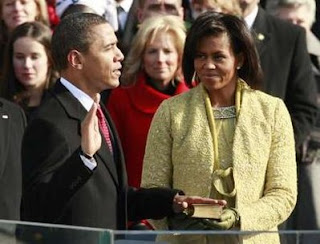President Barack Obama
 There may be no other ritual in American government that echo the values that founded this country than a presidential inauguration, especially when one president cedes power to his successor, and even more so when they are men of different parties. The orderly transition of power is one of the greatest attributes that our democracy offers. I can't help but get chills when I see one president peacefully and graciously handing over the keys to the government amidst pomp and pageantry. The aide who carries the "football," the suitcase that contains the codes for the nuclear arsenal, starts off his day answering to one president, but at the conclusion of the swearing in, answers to a different man. This is a result of a constitution that has operated like a sophisticated timepiece for two hundred years. Note that when a president takes the oath of office, he or she swears to defend the Constitution of the United States, which is paramount above all.
There may be no other ritual in American government that echo the values that founded this country than a presidential inauguration, especially when one president cedes power to his successor, and even more so when they are men of different parties. The orderly transition of power is one of the greatest attributes that our democracy offers. I can't help but get chills when I see one president peacefully and graciously handing over the keys to the government amidst pomp and pageantry. The aide who carries the "football," the suitcase that contains the codes for the nuclear arsenal, starts off his day answering to one president, but at the conclusion of the swearing in, answers to a different man. This is a result of a constitution that has operated like a sophisticated timepiece for two hundred years. Note that when a president takes the oath of office, he or she swears to defend the Constitution of the United States, which is paramount above all.I haven't watched every inauguration. I avoided the last two Bush inaugurations out of pique, I kind of feel bad about that (it's hard to blame me for the one in 2001) because all Americans should come together and wish the new president well. But of course today I was deliriously happy, and due to unemployment I was afforded the opportunity to lounge and watch every moment. I've loved everything about it.
As for Obama's speech, I thought it was terrific and tough, with an air of a strict teacher laying down a rigorous syllabus. He didn't stint on mentioning how difficult the times are, and how hard it's going to be to overcome them. But he framed this in terms of "we," not "I" (he only used the first-person pronoun three times in his speech). He laid the blame of these situations at all of our feet, referring to the verse in Corinthians I: "I will put aside childish things," implying that over the last period of time Americans have been acting childishly. He also didn't hold back, after thanking George Bush for his service, in talking about a renewal, a not-so-subtle back of the hand to the policies of the last eight years. For example, his statement that we need not abandon our ideals in times of war--which certainly must have been referring to the attempted rollbacks in civil rights and the ugly specter of torture.
I also liked the poem by Elizabeth Alexander, which painted in words scenes of every day America, and the benediction by Rev. Joseph Lowery, which ended in playful rhymes. The only misstep, which was inconsequential in the long run, was that Chief Justice John Roberts flopped a few words in the oath, throwing Obama for a bit of a loop. During the mingling before the luncheon in the Capitol, Roberts had a chance to take full responsibility for the gaffe. He was more nervous, apparently, than the new president.
Of course the most historic part of this day is the race of Mr. Obama. There are ironies everywhere, perhaps not the least of which is that he took the oath in front of spectators who stood on the ground of what was once a place where slaves were sold. He took the oath of office almost 200 years after the birth of Abraham Lincoln, and 100 years after the founding of the N.A.A.C.P. Also 100 years ago, William Howard Taft, in his inaugural address, had to make the statement that "Negroes are American." Changes in the United States can come incrementally, in awfully small steps, but most of the time we are heading in the right direction.


Comments
Post a Comment